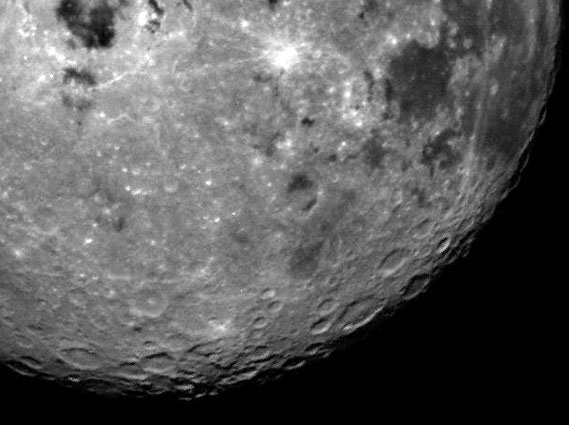Difference between revisions of "March 20, 2004"
| Line 1: | Line 1: | ||
__NOTOC__ | __NOTOC__ | ||
=An Unusual View of a Lunar Limb= | =An Unusual View of a Lunar Limb= | ||
| − | |||
| − | |||
<table width="640" border="0" align="center" cellpadding="6" cellspacing="2"> | <table width="640" border="0" align="center" cellpadding="6" cellspacing="2"> | ||
| − | + | <tr> | |
| − | + | </tr> | |
| − | |||
| − | |||
| − | |||
</table> | </table> | ||
<table width="85%" border="0" align="center" cellpadding="6" cellspacing="2"> | <table width="85%" border="0" align="center" cellpadding="6" cellspacing="2"> | ||
| − | + | <tr> | |
| − | + | <td colspan="2"><div align="center"> | |
| − | + | [javascript:;" onMouseOver="MM_swapImage('main_image','','images/LPOD-2004-03-20b.jpeg',1)" onMouseOut="MM_swapImgRestore() [[File:LPOD-2004-03-20.jpeg|LPOD-2004-03-20.jpeg]]]</div> | |
| − | + | </td> | |
| − | + | </tr> | |
| − | |||
</table> | </table> | ||
<table width="100%" border="0" cellpadding="8"> | <table width="100%" border="0" cellpadding="8"> | ||
| − | + | <tr> | |
| − | + | <td><div align="center" span class="main_sm">Image Credit: Galileo, Dec 8, 1990</div></td> | |
| − | + | </tr> | |
</table> | </table> | ||
| − | |||
<table class="story" border="0" bgcolor="#FFFFFF" width="90%" cellpadding="10" align="center"><tr><td> | <table class="story" border="0" bgcolor="#FFFFFF" width="90%" cellpadding="10" align="center"><tr><td> | ||
| − | + | <p class="story" align="center"><b>An Unusual View of a Lunar Limb </b></p> | |
| − | + | <p class="story" align="left"> | |
| − | + | As the Galileo spacecraft swung by the Earth-Moon system to get a gravitational boost for its long trip to | |
| − | + | Jupiter, it imaged the Moon. Most attention was focused on the Full Moon view of | |
| − | + | [LPOD-2004-03-18.htm Mare Orientale], visible at top right. No one seems to have paid much | |
| − | + | attention to the craters along the limb and terminator at the bottom of the image. I find it fascinating to try | |
| − | + | to identify familiar features when seen with a strange perspective like this. You try. In particular, see if you | |
| − | + | can figure out the name of the large crater at bottom right, or the brighter rimmed one a little further up along | |
| − | + | the limb. Move your mouse over the image for the surprising identifications. </p> | |
| − | + | <p class="story"><b>Related Links:</b><br> | |
| − | |||
| − | |||
| − | |||
| − | |||
[http://www.lpod.org/LPOD-2004-01-05.htm South Polar Wilderness]</p> | [http://www.lpod.org/LPOD-2004-01-05.htm South Polar Wilderness]</p> | ||
| − | + | <p class="story"> <b>Tomorrow's LPOD:</b> Fold A Moon</p> | |
| − | + | </td></tr> | |
| − | |||
| − | |||
| − | |||
</table> | </table> | ||
| − | + | <!-- start bottom --> | |
| − | </td></tr> | + | <table width="100%" border="0" cellspacing="2" cellpadding="4"> |
| − | + | <tr> | |
| + | <td><hr></td> | ||
| + | </tr> | ||
<tr> | <tr> | ||
| − | + | <td> | |
| − | + | <p align="center" class="main_titles"><b>Author & Editor:</b><br> | |
| − | + | [mailto:tychocrater@yahoo.com Charles A. Wood]</p> | |
| − | + | <p align="center" class="main_titles"><b>Technical Consultant:</b><br> | |
| − | + | [mailto:anthony@perseus.gr Anthony Ayiomamitis]</p> | |
| − | + | <p align="center" class="main_titles"><b>A service of:</b><br> | |
| − | + | [http://www.observingthesky.org/ ObservingTheSky.Org]</p> | |
| − | + | <p align="center" class="main_titles"><b>Visit these other PODs:</b> <br> | |
| − | + | [http://antwrp.gsfc.nasa.gov/apod/astropix.html Astronomy] | [http://www.msss.com/ Mars] | [http://epod.usra.edu/ Earth]</p></td> | |
| − | + | </tr> | |
| − | |||
| − | |||
| − | |||
| − | |||
| − | |||
| − | |||
| − | |||
| − | |||
</table> | </table> | ||
| − | |||
| − | |||
| − | |||
<p> </p> | <p> </p> | ||
| − | |||
| − | |||
| − | |||
---- | ---- | ||
===COMMENTS?=== | ===COMMENTS?=== | ||
Click on this icon [[image:PostIcon.jpg]] at the upper right to post a comment. | Click on this icon [[image:PostIcon.jpg]] at the upper right to post a comment. | ||
Revision as of 17:17, 4 January 2015
An Unusual View of a Lunar Limb
Image Credit: Galileo, Dec 8, 1990 |
|
An Unusual View of a Lunar Limb As the Galileo spacecraft swung by the Earth-Moon system to get a gravitational boost for its long trip to Jupiter, it imaged the Moon. Most attention was focused on the Full Moon view of [LPOD-2004-03-18.htm Mare Orientale], visible at top right. No one seems to have paid much attention to the craters along the limb and terminator at the bottom of the image. I find it fascinating to try to identify familiar features when seen with a strange perspective like this. You try. In particular, see if you can figure out the name of the large crater at bottom right, or the brighter rimmed one a little further up along the limb. Move your mouse over the image for the surprising identifications. Related Links: Tomorrow's LPOD: Fold A Moon |
|
Author & Editor: Technical Consultant: A service of: |
COMMENTS?
Click on this icon File:PostIcon.jpg at the upper right to post a comment.




